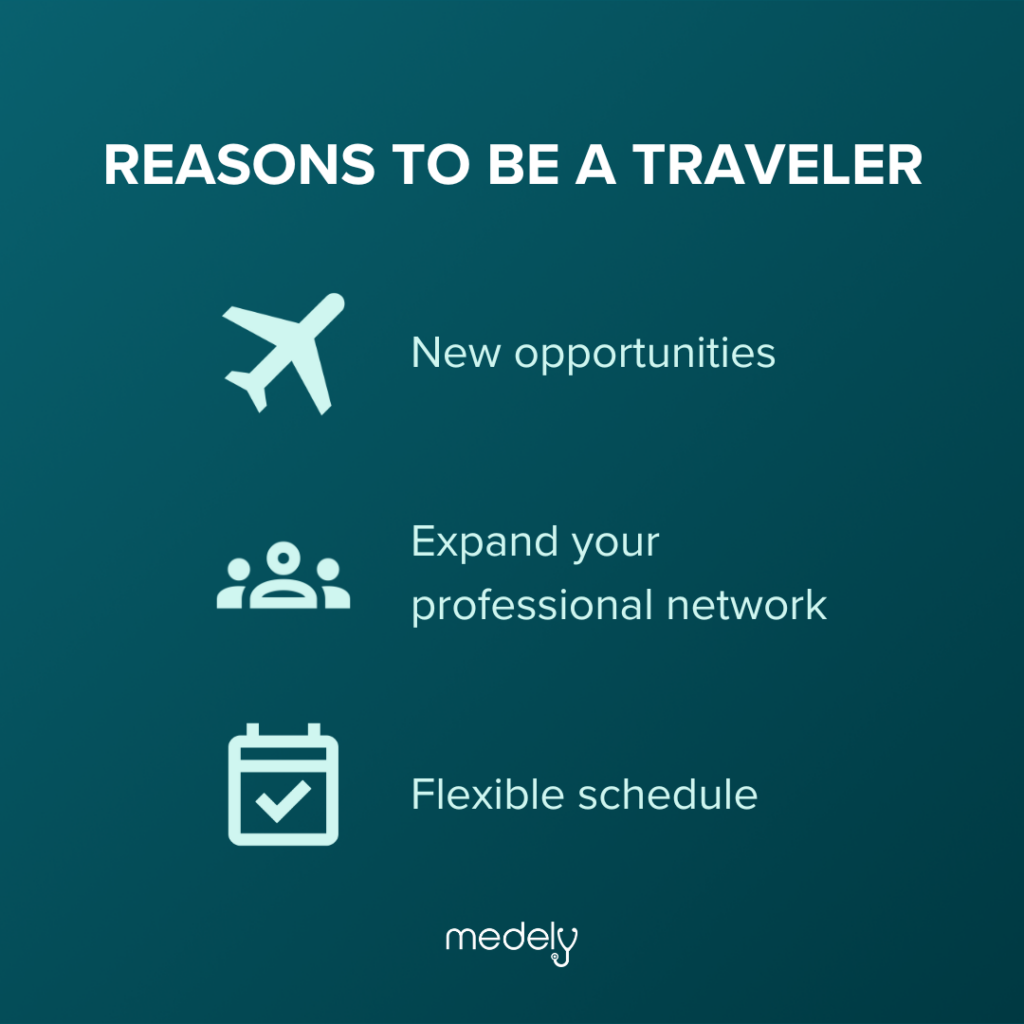Travel nursing has maintained popularity among nurses and health professionals who are looking for adventure and new opportunities in their careers. And with Medely’s travel opportunities through its affiliate, Frontline Health, you can find the perfect assignments for your life and schedule. If you’re thinking about becoming a travel nurse or health professional or simply wondering “how does travel nursing work?”, our travel experts have some tips to help you start your traveling journey.
Why should you be a travel nurse or health professional?
If you’re thinking about travel nursing, there’s no shortage of reasons you should start.
New opportunities
Not only does traveling give you the opportunity to adventure and explore a new city, but it also can be a great opportunity to expand your professional knowledge and skills. As a travel nurse, you’ll get thrown into new environments that you’ll quickly have to adjust to. Travel nurses are often the first ones to float to a different unit, so you might experience what it’s like to work in a different unit, which can help you master skills outside of your specialty.
As a travel nurse, you get to experience alternative ways of doing things, patients that will challenge and grow your skills, and opportunities to work with a variety of nurses and health professionals. The experience you gain while traveling is a great way to become a stronger nurse or health professional who’s more equipped to handle any situation that comes your way.
Expand your professional network
Becoming a travel nurse or health professional gives you the opportunity to expand your professional network and meet healthcare professionals across the country. Creating a strong network with new coworkers or other travel healthcare professionals that you meet on your assignment can provide you with a sense of community and a great system for learning from healthcare professionals who have been in the industry for longer. Connections across the country can also help you find new opportunities later in your career.
Flexible schedule
One of the draws of travel nursing is the ability to have a flexible schedule. With assignments ranging from 4-13+ weeks, you can take an assignment when you want and schedule breaks in between. Being a travel nurse or healthcare professional gives you more time to create a schedule that works for you so you can spend more time doing activities you’re passionate about.
On top of the freedom a flexible schedule gives you, it also means you can choose where you work. So whether you’ve always wanted to explore the mountains or you want to be by the beach, you can explore wherever the travel bug takes you – all while getting paid to work.

Travel Nurse Requirements
In order to become a travel nurse or health professional, Frontline Health, an affiliate of Medely, has a few requirements that you have to meet.
- At least eight months of experience in your specialty/unit – Frontline requires at least eight months of experience for assignments, but other platforms might require more experience. As a travel nurse, you have to have a good knowledge base and the ability to hit the ground running at any facility you step foot in. Make sure you feel confident and comfortable in your ability to navigate healthcare settings and act quickly.
- Current and unencumbered license – To start travel nursing, you have to make sure that your license is up-to-date. According to Nursys, an unencumbered license “means that the nurse has a full and unrestricted license to practice by the state board of nursing.”
- Immunizations, certificates, credentials – Much like other positions in the medical field, there will be requirements for what immunizations you need to have, what credentials are required of you, and more. So be prepared to have all that information ready to go and easily accessible when you’re signing up.
How does travel nursing work through Medely’s affiliate Frontline Health?
If you want to become a travel nurse or health professional, signing up for Frontline Health through Medely is a great first step. Not only can you access assignments across the country, but Frontline Health also makes the process easy with some fantastic features:
Simple signup
Making the decision to become a travel nurse or health professional takes a lot of work and planning, so we want to make the sign-up process as simple as possible. You can sign up to use the platform in just a few minutes, so you can be on your way to finding the best assignments. After signing up, you’ll speak with one of our clinical specialists who will walk you through the whole process, make sure you have the experience needed to seamlessly integrate into any facility, and assist you with any questions you might have. After you complete the whole process, you’ll be able to find assignments nationwide by just searching on your phone.
Per diem markets
On top of helping you find travel assignments through its affiliate Frontline Health, Medely also offers per diem shifts in over 40 markets across the country. If you’re traveling in a city that offers both travel and per diem, you can pick up per diem shifts while you’re in between travel assignments or supplement your travel assignment with a per diem shift on your day off to earn a little extra cash.
Healthcare recruiters
With Frontline Health’s talented healthcare recruiters, you’ll be able to find the best travel assignments for you and your journey. Our healthcare recruiters are with you throughout the entire process. After you apply for an assignment, they’ll touch base with you to review all the information and requirements for an assignment and answer any questions that you may have. If you receive an offer, they’ll be there to walk you through the next steps and make sure you’re ready to start your next assignment.
Based on your position and what you’re looking for in an assignment, they can also help keep an eye out for assignments that you might have missed that might work well for your specialty, skills, or wants in a contract. With help from our healthcare recruiters, you’ll be able to find assignments that work for your schedule and that check all your boxes.
What our travel nurses are saying
“My recruiter has been very helpful with my first travel assignment. The whole team has answered all my questions and has made this a great experience.”
-Hilary Kocsisszucs, Registered Nurse
“Medely is a great tool to have in my back pocket… I’ve never worked with a platform that’s just that simple.”
–Lorelei Farabaugh, Registered Nurse
“I choose to travel because I like the flexibility and just deciding when I want to work whenever I want and just taking the time off to spend more time with my friends, family, and just go on vacation.”
Tobe Ezimora, Registered Nurse
Travel Assignments
Ready to take the leap into being a travel nurse or health professional or still wondering, “How does travel nursing work?” Head to https://medely.com/assignments to learn more and find travel assignments that are right for you!



